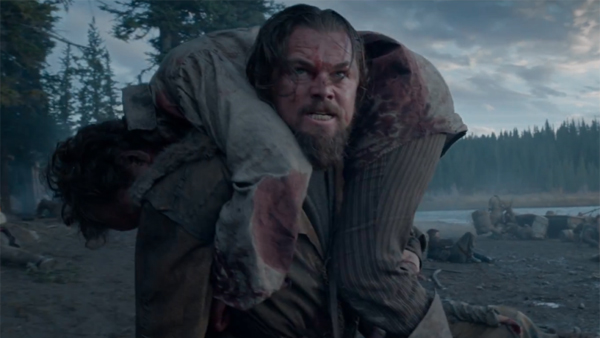The Revenant Review
Hardship is an easy thing to depict on film, but hardship in service of something meaningful to the butts in front of the screen is more of a challenge. 12 Years a Slave is a recent film that pulled it off with flying colors. How? It showed us who its lead character was before injustice befell him. That contrast added impossibly high stakes to his story and allowed the viewer to connect to the story on an emotional level — to put himself or herself in the sufferer’s shoes.
Alejandro Gonzalez Inarritu’s The Revenant does none of that. Its lead character’s high point is a bloody raid by Native Americans on his company that results in 20 deaths. It presents him — and as a result, us — with two types of injustice: man-made and cosmic. The former is an unnecessary crime committed out of cowardice that could have been completely avoided if not for the cosmic injustice of life on the American frontier circa 1823. As a result, we’re left sitting in awe of a beautiful film that apparently has nothing to say other than, “Doesn’t life suck?”
Actually, it doesn’t, but your movie definitely does.
The film’s primary sufferer is Hugh Glass (Leonardo DiCaprio). He’s one of many pelt hunters working under the command of Captain Andrew Henry (Domhnall Gleeson) in the unsettled American wilderness. Hugh’s half-Native-American son, Hawk (Forrest Goodluck), is alongside him when their group is attack by a tribe of Arikara, who’re looking for their chief’s missing daughter.
The few who survive leave their pelts behind for the time being so they can find shelter at the nearest fort and regroup. During this hunt for safety, Glass encounters a grizzly bear that tears him to shreds. An inch away from death, his fellow travelers are forced to carry him up the cold and unforgiving Rockies. At the urging of another in their group, Fitzgerald (Tom Hardy), Henry realizes he’s putting everyone in greater danger, so he offers three men — Hawk, Fitzgerald, and Bridger (Will Poulter) — $100 to stay behind, wait for him to die, and give him a proper burial. Fitzgerald, it seems, has other ideas. He murders one in their crew and escapes, leaving Glass in a shallow grave and desperate for vengeance.
The film is written by Inarritu and Mark L. Smith, whose screenplay is based on a novel by Michael Punke. If they could have deviated from the book’s inciting incident, the film could have been much better. Because everything that happens in this film ultimately stems from a chance encounter with a bear, one can’t help but leave feeling like dozens died horrible, often painful deaths by chance. The Revenant‘s characters lack agency for most of the bloated run time. This makes it really hard to connect with these people in this place and time, and it forces some of the potentially pulpy and satisfying revenge elements to play second fiddle to cosmic cruelty.
Did you know Leonardo DiCaprio was really cold and ate raw bison liver while filming this? It’s true, and as such, he obviously deserves an Oscar. I kid, of course, but this is what shameless campaigning does to one’s perception of the quality performance. Objectively, DiCaprio does a good job. He and Inarritu want you to know that Glass is suffering. They do everything possible to make sure you can’t confuse his indescribable and inescapable misery for indifference or even enjoyment. Everything about this world and these people is as tragic as Ryuichi Sakamoto’s mournful cello.
The film also boasts some very in-your-face cinematography from the extraordinary talented Emmanuel Lubezki. His eye for natural beauty is arguably unparalleled — at least in terms of cinema — but here, his imagery gives Inarritu an excuse to play Malick. The Revenant is not the life-affirming experiment that was The Tree of Life. It has the same aspirations but simply isn’t thoughtful enough in its approach, which makes Lubezki’s objectively great visual achievement feel a little hollow.
Tom Hardy and Domhnall Gleeson do solid work in roles as limited as Dicaprio’s. I was perhaps most interested in Gleeson’s struggle to maintain control over his men, but Inarritu doesn’t much care. After all, DiCaprio has to cauterize his gaping neck wounds and carve out a horse carcass to sleep in.
That’s this movie. Doesn’t it sound fun?


















Pingback: The Revenant – Beautiful but Overrated | Nola Film Vibes